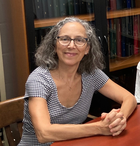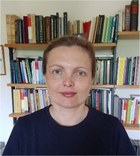Speakers

Holger Diessel
Holger Diessel is Professor of English Linguistics at the Friedrich-Schiller-Universität Jena. He received a PhD in General Linguistics from the University of Buffalo and was a postdoctoral researcher at the Max-Planck-Institute for Evolutionary Anthropology in Leipzig. His research interests include linguistic typology, L1 acquisition, language change, and usage-based construction grammar. He has published more than 50 articles in journals and edited volumes and three monographs: Demonstratives. Form, Function and Grammaticalization (1999), The Acquisition of Complex Sentences (2004), and The Grammar Network. How Linguistic Structure is Shaped by Language Use (2019).

Yael Maschler
Yael Maschler is Professor of General and Hebrew Linguistics at the University of Haifa, Israel. Specializing in Interactional Linguistics and in Discourse and Grammar, her research explores the crystallization of grammatical structure from interaction. She is the author of Metalanguage in Interaction: Hebrew discourse markers (2009, John Benjamins) and of numerous articles. Her recent co-edited collections include Emergent Syntax for Conversation: Clausal patterns and the organization of action (Maschler, Pekarek Doehler, Lindström, & Keevallik (2020, John Benjamins)) and Pseudo-Clefts from a Comparative Pragmatic Typological Perspective (De Stefani, Lindström, & Maschler (in press, Special Issue of Lingua)). She has recently started investigating the grammar-body interface in social interaction and is currently principal investigator of the project “From Emergent Complex Syntax to Discourse Markerhood: The Hebrew Grammar-Body Interface in a Cross-Language Comparison”, funded by the Israel Science Foundation, investigating grammar-in-interaction cross-linguistically.

Salvio Digesto
Salvio Digesto is Assistant Professor of Linguistics in the Department of French at Dalhousie University. He is a variationist sociolinguist studying language use within its social context and focuses on issues such as: morphosyntactic variation and change, minority languages, bilingualism and outcomes of language contact, acquisition of sociolinguistic competence in L2, as well as the relationship between prescription, linguistic prestige and usage. In his research, he draws on insights and questions from (socio)linguistic theory, and links those questions to empirical observations by integrating quantitative and statistical modeling to the study of language, with a focus on Canadian French and Italian. He has recently started investigating syntactic variation and language contact in Acadian French. The project titled “Inherent patterns of linguistic variation in local varieties of Acadian French versus standard linguistic ideology” is funded by the Office of the Vice-President, Research and Innovation (Dalhousie University).

Sali A. Tagliamonte
Sali A. Tagliamonte is Canada Research Chair in Language Variation and Change, a Full Professor of Linguistics, and the current Head of the Linguistics Department at the University of Toronto. She is a member of the Royal Society of Canada and a Fellow of the Linguistic Society of America. Her research focusses on morph-syntactic and discourse-pragmatic in English and features large archives of vernacular speech, cross-community comparisons, and real and apparent time data, to explore linguistic change. She has authored six books and is the editor of the monograph series, Studies in Language Variation and Change, published by Cambridge University Press.

Benedikt Szmrecsanyi
Benedikt Szmrecsanyi is professor of linguistics at KU Leuven. He studied English philology, political science, and economics at the University of Freiburg (Germany) and at Georgetown University (Washington D.C.). He holds MA (2002), PhD (2005), and Habilitation (2011) degrees from the University of Freiburg. Prior to coming to Leuven, he was a tenured Lecturer in English Linguistics at the University of Manchester (UK). Recent books include Grammatical Variation in British English Dialects (2013, CUP), and Aggregating Dialectology, Typology, and Register Analysis (2014, edited with Bernhard Wälchli, de Gruyter). He has some 30 papers in international, peer-reviewed journals, including e.g. in Language, Language Variation and Change, the Journal of Linguistic Geography, the International Journal of Corpus Linguistics, and English World-Wide. He is an associate editor of the journal Cognitive Linguistics, and among other things currently directs a Research Foundation Flanders-funded project on the register-specificity of probabilistic grammatical knowledge in English and Dutch.

Natalia Levshina
Natalia Levshina is a linguist working at the Max Planck Institute for Psycholinguistics in Nijmegen. Her main research interests are cognitive and functional linguistics, pragmatics, typology, corpora and statistics. She obtained her PhD at KU Leuven in 2011 and got her habilitation qualification at Leipzig University in 2019 with a thesis “Towards a theory of communicative efficiency”. An extended and revised version of the thesis is to appear later this year in the form of a book (Cambridge University Press). She has published corpus-driven cross-linguistic papers on causatives, differential case marking, politeness, word order variation and other linguistic topics. In addition, Natalia is the author of a best-selling statistical manual “How to Do Linguistics with R” (Benjamins, 2015).